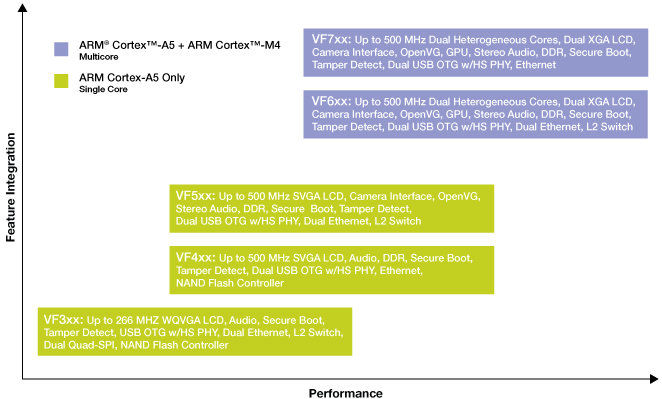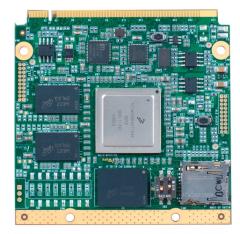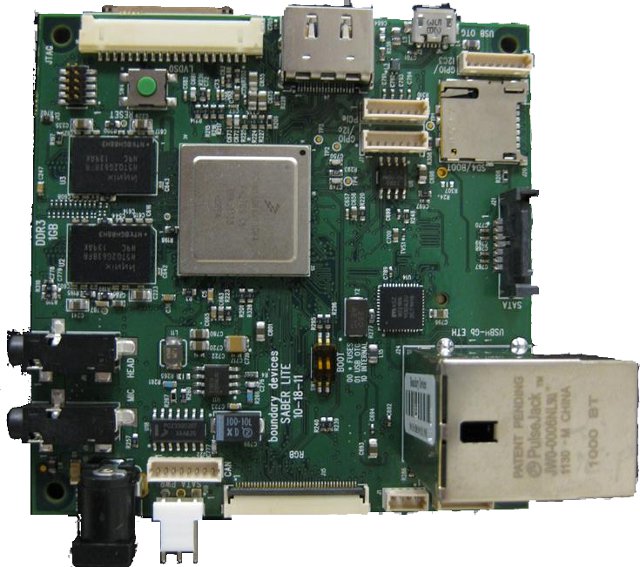Freescale announced the new Vybrid platform based on Cortex A5 application processor and Cortex-M4 MCU (VF6xx and VF7xx family only) which targets building/home automation and control, industrial automation, point-of-sale systems, medical devices, smart energy equipment, and appliances. There are 5 families of Vybrid Controllers which support the following common features: Video/Camera Interface Unit + optional OpenVG GPU (except VF3xx) Up to 800 MHz data rate DDR3 and LPDDR2 support (except VF3xx) USB 2.0 OTF with Integrated PHY (1 or 2 depending on model) Ethernet 10/100 MAC (1 or 2 depending on model) Display controller (WQVGA to XGA resolutions) High-assurance boot with Crypto Acceleration Up to 1.5 MB on chip SRAM NAND Flash controller and Dual Quad-SPI with eXecute-In-Place(XIP) Dual 12-bit ADC and DAC Here are the 5 families of Vybrid platforms and key differentiating features: VF3xx: ARM Cortex-A5 up to 266 MHz, 1x USB 2.0 OTG, 2x Ethernet, display up […]
iWave Systems Rainbow-G15M-Q7: Qseven SOMs Based on Freescale i.MX 6 Series
iWave Systems, an embedded systems company based in Bangalore, India, has launched Qseven Modules powered by Freescale i.MX 6Quad (quad-core Cortex A9 processor), i.MX 6Duo (dual -core) and i.MX6 Solo. The Rainbow-G15M-Q7 modules are compliant with Qseven specification R1.20 and target the Industrial, Automotive and Medical markets. Here are the modules specifications: CPU: Freescale i.MX6 Cortex A9 Q/D/S core @ 1 GHz Memory: 1GB DDR3 SDRAM– Expandable to 4GB Optional 8GB eMMC Flash On-Board Micro SD slot Qseven Edge Connector : PCIe v2.0 HDMI 1.4 SATA 3.0 Gigabit Ethernet Dual LVDS LCD Support 4 x USB 2.0 Host | 1x USB 2.0 device AC97 Audio 8-Bit SD/MMC CAN1, SPI & I2C ports Debug Port Expansion Connector: 2x Camera CSI MIPI CSI & DSI 24 Bit RGB LCD IF Triple UART 4×4 Key Matrix ESAI (Embedded Software Application Interface) , SPDIF MLB (Media Local Bus), CAN2 I2C, PWM, GPIO, Memory bus Form […]
Linux 3.3 Release
Linux Torvalds announced the release of Linux Kernel 3.3 on the 18th of March: So after the extra -rc release last weekend, now the final 3.3 is out there in the usual locations. Things did indeed calm down during the last week, and the shortlog looks pretty boring. The diffstat from -rc7 is dominated by the arch/tile defconfig changes, the rest is pretty small, although there are changes spread out in various subsystems (drivers, filesystem, networking, perf tools). … And obviously, the 3.3 release means that the merge window for 3.4 is now open, although I may keep of pulling stuff for a day or so to encourage people to test the actual release. Linux 3.2 brought ext-4 and btrfs file system improvements, support for Qualcomm Hexagon processor, an improved profiling tool (perf top), and better CPU and network bandwidth management. Linux 3.3 brings the following key changes: Android merge: […]
Using OpenOCD JTAG in Android Kernel Debugging – Android Builder Summit 2012
Mike Anderson, CTO and Chief Scientist for The PTR Group, gives a tutorial about Linux kernel debugging in Android with OpenOCD JTAG at the Android Builder Summit in February 2012. Abstract: Owing to the use of the Linux kernel, Android device drivers can be debugged using many of the same techniques as Linux. Still, much of the user-space interface code typically found in Linux is missing in Android. This complicates the debugging of kernel driver code. This presentation will demonstrate the use of the open on-chip debug (OpenOCD) software and an inexpensive JTAG to debug Android kernel code. The target audience for this presentation are platform developers looking to debug their kernel code such as device drivers. This presentation is targeted at intermediate-level developers with some understanding of kernel code development. You can also download the presentation slides on linuxfoundation.org website. Jean-Luc Aufranc (CNXSoft)Jean-Luc started CNX Software in 2010 as […]
Command Line Methods to Completly Delete a Hard Drive in Linux
Here are 2 methods to completly dlete the content of an hard drive with dd and shred commands. With those methods you won’t be able to recover the data. This can be useful in case you want to sell, throw away your hard drive / computer or have doubtful activities. If the partitions you want to delete are system (boot) partitions you’ll need to start your system with a live CD / USB such as SystemRescueCD or GParted. Finding the location of a drive or partition In order to know the exact path for your drive, you can use the fdisk command as root or sudoer: # fdisk -l Disk /dev/sda: 1887.4 GB, 1887436800000 bytes 255 heads, 63 sectors/track, 229467 cylinders Units = cylinders of 16065 * 512 = 8225280 bytes Device Boot Start End Blocks Id System /dev/sda1 1 25 200781 83 Linux /dev/sda2 26 229335 1841932575 83 Linux […]
How to Install Windows 8 in Linux with QEMU
Microsoft has just released Windows 8 Consumer Preview. Here’s a method to install Windows 8 in Linux using KVM and Qemu. You can use this beta version of Windows 8 until the 15th of January 2013, after which it will be unusable. Here are the requirements to install Windows 8: 1 GHz Processor or greater 1 GB RAM 20 GB free storage for the 64-bit version Before you start, make sure your processor supports Intel Virtualization Technology (VT) or AMD’s AMD V CPU virtualization extensions. Type this command to check vmx or svm flags:
|
1 |
egrep --color "(vmx|svm)" /proc/cpuinfo |
If this is the case, you can install KVM. Type the following command for RPM-based distributions such as Fedora:
|
1 |
sudo yum install kvm |
or the following command for Debian or Ubuntu:
|
1 |
sudo apt-get install qemu-kvm |
Then download the ISO image of Windows 8 on Microsoft website (64-bit version) :
|
1 |
wget http://iso.esd.microsoft.com/WCPDL/BD1B8A49393E30CC9C4E5C88457D73E964F1F3B18/Windows8-ConsumerPreview-64bit-English.iso |
Create a 20 GB virtual hard drive to install Windows 8: […]
Free Electrons Releases Embedded Linux Training Materials
Free Electrons, a technology company offering embedded Linux consulting services as well as embedded Linux training, has released their training materials for Linux and system development for embedded systems including their Lab sessions. The training materials are available in their git repository in LaTeX format. If you want the latest documentation in PDF, you’ll need to build it by following those steps: Install the required packages:
|
1 |
sudo apt-get install git dia inkscape texlive-full python-pygments |
Get the embedded Linux slides source:
|
1 |
git clone <a href="git://git.free-electrons.com/training-materials.git">git://git.free-electrons.com/training-materials.git</a> |
Build the training materials:
|
1 2 3 4 |
cd training-materials make full-sysdev-labs.pdf make full-kernel-labs.pdf make full-sysdev-slides.pdf |
The last three commands will generate the PDF files respectively: full-sysdev-labs.pdf – Embedded Linux Training Lab Book (58 pages) with instructions for the IGEPv2 board based on on TI DM3730 or OMAP3530. full-kernel-labs.pdf – Linux kernel and driver development training Lab Book (37 pages) full-sysdev-slides.pdf – Embedded Linux system development presentation slides (506 pages) Free Electrons also have slightly older version of full-kernel-labs.pdf and full-sysdev-slides.pdf available for download as PDF so […]
Boundary Devices Unveils Nitrogen6X Freescale i.MX6 Development Kit (aka i.MX6q Sabre Lite)
Arrow Electronics and Boundary Devices have launched the Nitrogen6X, a low cost development kit based on Freescale i.MX6 quad-core cortex A9 processor. Here are the technical specifications of the Nitrogen6X board: Quad-Core ARM Cortex A9 processor at 1GHz (i.mx6Quad) 1 GB of 64-bit wide DDR3 @ 532MHz Board Dimensions: 4.5″ x 3″ 2MB Serial Flash Three display ports (PRGB, LVDS, HDMI) Parallel camera port with OV5642 Interface Multi-stream-capable HD video engine delivering 1080p60 decode, 1080p30 encode and 3-D video playback in HD Superior 3-D graphics performance with quad shaders for up to 200 Mt/s Separate 2-D and/or Vertex acceleration engines for an optimal user interface experience Serial ATA (SATA) Dual SDHC card slots PCI express port Analog (headphone/mic) Audio 10/100/1G Ethernet with Power over Ethernet support 2 RS-232 Serial ports 10-pin JTAG interface I2C/GPIO/SPI 3 High speed USB ports (2xHost, 1xOTG) CAN port TiWi 802.11 b/g/n WiFi+BT optional Supports Android […]






